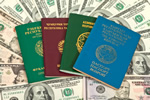Thailand to ask expats to help restore its tourism numbers

Thailand to ask expats to help restore its tourism numbers
It’s not just local businesses which rely on high numbers of incoming tourists to keep going, it’s also the large number of businesses owned and run by expatriate professionals in hospitality sectors which profit from a vibrant tourism industry. Thailand is one example of reliance on tourism for a sizeable chunk of its GDP although, unfortunately, Chinese all-inclusive tours have provided much of the revenue.
The northern hub of Chiang Mai was a favourite for Chinese groups from Hubei province and its capital Wuhan, with two to three flights a day bringing visitors on Chinese-organised package tours aimed at mainly Chinese-owned businesses but taking in local providers as well. Nowadays, no flights mean no Chinese, with the pandemic’s effects resulting in many businesses run by Western expats as well as local traders going out of business.
The Thai government is now finalising a plan to promote domestic tourism as the majority of its borders are now closed and a ban on foreigners entering the Kingdom is still in place. As part of the plan and once the borders are opened, the large concentrations of foreigners living in Thailand will be encouraged to attract colleagues and friends in the home country, with incentives provided to ensure success. According to an official, the various expat communities are the most important sectors to be approached in order to persuade millennials as well as business and leisure travellers to visit the country once the bans are lifted.
Thailand’s tourism authority is to focus mainly on the domestic market, but will also be encouraging the European, Chinese and Japanese expatriate communities to join in the country’s rebirth as a prime tourism destination, a crown it recently relinquished due to several unfortunate comments from one government official. In addition, visa rule changes at immigration offices have recently resulted in a rush by formerly resident expats to Thailand’s more welcoming neighbours, including Vietnam and Cambodia.
In the past, many would-be retired expatriates from Europe and especially the USA arrived for long-term stays after visiting as tourists. Now that almost all bets are off as regards overseas visitors unless they’re Chinese, it’s to be hoped that already established Western and other expats are in a forgiving mode after being asked to help restore the once-popular country’s image as tourism heaven. For the sake of the country’s GDP and the millions of Thais who’ve lost their basic level jobs in the sector, it’s to be hoped this turnaround is successful.
Related Stories:
- Is Kuwaitization the unintended result of the oil price crash? - July 20, 2020
- Expats in Malaysia still banned from overseas travel - July 17, 2020
- HSBC Asia to cut back on internal expat relocations - July 16, 2020
- Tips on integrating for newly-arrived expats - July 15, 2020
Latest News:
- Tips on a trouble-free relocation as an expat overseas - July 20, 2020
- Expats find peace in the covid-19 refuge of Dahab town - July 20, 2020
- Is Kuwaitization the unintended result of the oil price crash? - July 20, 2020
- Expats unhappy abut changes to Korean points-based visa system - July 17, 2020
- Chiang Mai and Bangkok no longer bargain locations for expats - July 17, 2020
- Expats in Malaysia still banned from overseas travel - July 17, 2020
- Vietnam welcomes expats to its safe, affordable lifestyle - July 16, 2020
- Asian tiger economies reach out to expats in Hong Kong - July 16, 2020
- HSBC Asia to cut back on internal expat relocations - July 16, 2020
- Tips on integrating for newly-arrived expats - July 15, 2020


